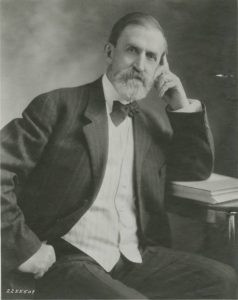
Photo info …
Credit: Bass Photo Co Collection, Indiana Historical SocietyView Source
(Dec. 20, 1849-Aug. 17, 1917). A native of Howard County, Indiana, John Worth Kern Sr. was raised in Indiana and Iowa. An avid Democrat, he was a schoolmaster in Indiana and a law student at the University of Michigan before opening his attorney’s office in Kokomo.
Throughout his adult life, he sought elective office as a Democrat in a strongly Republican state, winning the voters’ support only twice in nine contests. After failing to win a seat in the state legislature in 1870, Kern was elected reporter of the Indiana Supreme Court on the victorious state ticket in 1884. He moved to Indianapolis as the court reporter and also practiced law.
Defeated for reelection in 1888, he was sent to the state Senate in 1892. There he defended labor unions and supported the passage of child labor legislation. , Indianapolis’ Democratic mayor, made Kern city attorney, and in 1900 and 1904 he was his party’s unsuccessful candidate for governor.
In 1908, Kern first gained national prominence. Although a “gold” Democrat, the Hoosier actively supported William Jennings Bryan in the 1896 presidential campaign, gaining the lasting friendship of the Nebraskan. When Bryan ran for the White House for a third time in 1908, Republican William Howard Taft’s victory appeared all but certain, so few Democrats were eager to join Bryan on his ticket.
With Taggart’s backing and Bryan’s approval, Kern was chosen vice-presidential nominee by acclamation. His prolabor record and his progressive views in favor of civil service reform, a graduated income tax, and a lower tariff made him an attractive running mate. Despite a very active Democratic campaign, Taft won an overwhelming victory.
Kern’s major contribution to American political life came in the U.S. Senate. The Republican split between Taft and Roosevelt in 1908 gave Hoosier Democrats control of the State House, and in 1911 the legislature elected Kern to the Senate. In Washington, he quickly gained a national reputation as a progressive. Following Woodrow Wilson’s election in 1912, Kern’s Democratic colleagues made him majority leader.
From 1913 to 1917, Kern developed this position into an efficient instrument for translating administrative policies and party goals into legislation. By appealing to party loyalty, employing the president’s influence, and convincing his colleagues to respect decisions reached at caucuses as binding, the Hoosier legislator helped to win Senate approval for Wilson’s New Freedom program. Following the enactment of the 17th Amendment, Kern faced the general electorate in his 1916 campaign and met defeat. He died from tuberculosis the following summer.

Help improve this entry
Contribute information, offer corrections, suggest images.
You can also recommend new entries related to this topic.

